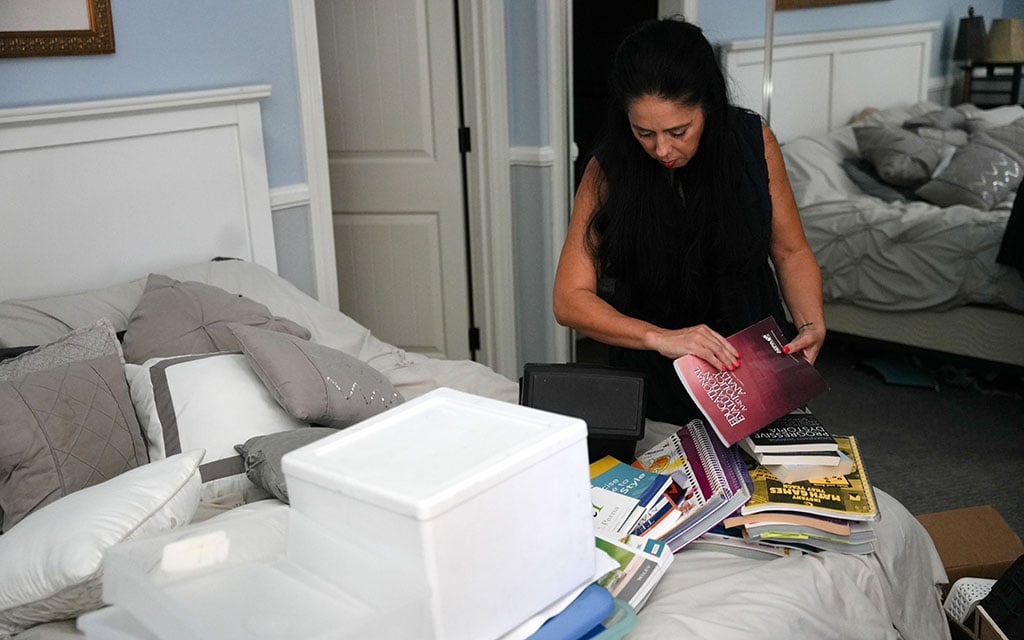You are here
I'm tired’: Teachers face mental health crisis due to low pay, pandemic stress, scant support
Primary tabs
 Amid COVID, teachers face growing mental health crisis Navigating low salaries, pandemic worries and burnout: Many teachers will tell you this is the job description of modern educators. The result is an expanding mental health crisis among U.S. teachers – a problem so dire that many are leaving the profession. Cronkite News - Arizona PBS
Amid COVID, teachers face growing mental health crisis Navigating low salaries, pandemic worries and burnout: Many teachers will tell you this is the job description of modern educators. The result is an expanding mental health crisis among U.S. teachers – a problem so dire that many are leaving the profession. Cronkite News - Arizona PBS Just weeks before teacher Michelle Capriotti is set to leave her family to take a better-paying job in California, she stands in her living room on a recent afternoon, chatting with her son about the changes coming their way.
“How do you feel about me leaving?” Capriotti asks Christopher, a 17-year-old with special needs, as he makes his way down the stairs.
“They actually called today. You’re fired so you don’t even have to go!” he says in jest.
“Fired from a job I haven’t even started?” she replies, laughing.
Turning away, she notes that Christopher does this whenever her move comes up.
“He is not happy that I’m leaving.”
Capriotti, a public school teacher in the East Valley for more than 27 years, said she took the job in San Jose because she’ll double her pay and get better benefits. Come August, she will fly home every other week to see her family. Even with the cost of airfare, she said, she’ll still be making more money.
Capriotti says her story is common among Arizona teachers. She anticipates a “mass exodus” of educators in coming years – due to low pay, rising stress made worse by the COVID-19 pandemic, and an overall feeling of enough is enough.
“I know more teachers leaving this year than I ever have in my career, and they’re not leaving because they’ve reached the age of retirement,” she said. “They’re tired. It was one thing to hold it together during a crisis, but at some point teachers became the bad guy.
“It’s taxing. It’s frustrating.”
The result, studies show, is a widespread and growing mental health crisis among U.S. teachers – a problem so grim that many are leaving the field or, like Capriotti, making drastic lifestyle changes.
Long before the pandemic, 46% of K-12 teachers reported high levels of job-related stress, according to a 2014 Gallup report on the state of America’s schools.
Fast forward to 2022. A new RAND report finds that 73% of teachers feel frequent job-related stress, 28% have symptoms of depression, and 59% report burnout. Rates of burnout and depression are highest among teachers of color.
A National Education Association survey from February concluded that burnout is the top issue facing educators, with 90% of teachers calling the issue “very serious or somewhat serious.” About 55% of teachers said they were considering leaving the field earlier than planned, with Black and Hispanic teachers even more likely to quit or retire.
“People are taking on second and third jobs. They are having to travel huge distances just to secure jobs where they can financially make due or to get the needs met for their own children,” she said.
Children who are frequently in high-stress environments tend to mimic the symptoms of behavioral disorders even if they don’t have them. McCormick said this often leads to children receiving treatment for something that could be resolved in the classroom.
“The hard and fast of it is that there aren’t enough therapists, at all, to treat every kid who looks like they have some sort of emotional or behavioral problem,” she said. “By paying attention to the mental health of teachers, we can make such a big impact, with fewer resources, on children.”
“Happy teachers means happy kids, and I think that’s worth sinking a lot of time and money into.”
Research shows that nationwide, women report experiencing more pandemic-related stress than men, in part because they often play a bigger role in juggling childcare or family responsibilities with careers.
In Arizona, 76% of all teachers are women. The 2022 RAND report found that 78% of female teachers in the U.S. felt frequent stress, compared with 59% of men.
When asked about the availability of mental health resources for teachers, Capriotti snickered and said her insurance covered 10 counselor visits.
“There’s not a whole lot that you can fully deal with in 10 visits … and, also, who has the time?” she said. “They’ll schedule a counseling appointment at 10 o’clock on a Tuesday, but at 10 on a Tuesday you’re teaching a class, so there’s very little support out there.”
When Capriotti’s daughter, Caitlin, decided to spend a year working as a substitute teacher before entering law school, she offered some solemn advice about teaching in Arizona: “Don’t love it too much.”



Recent Comments